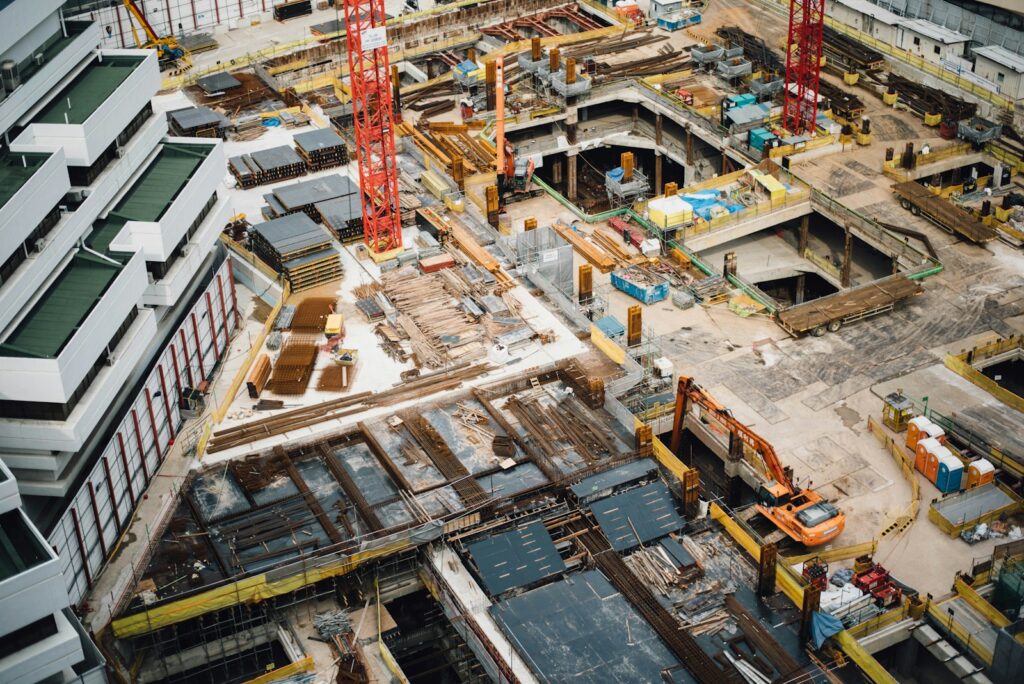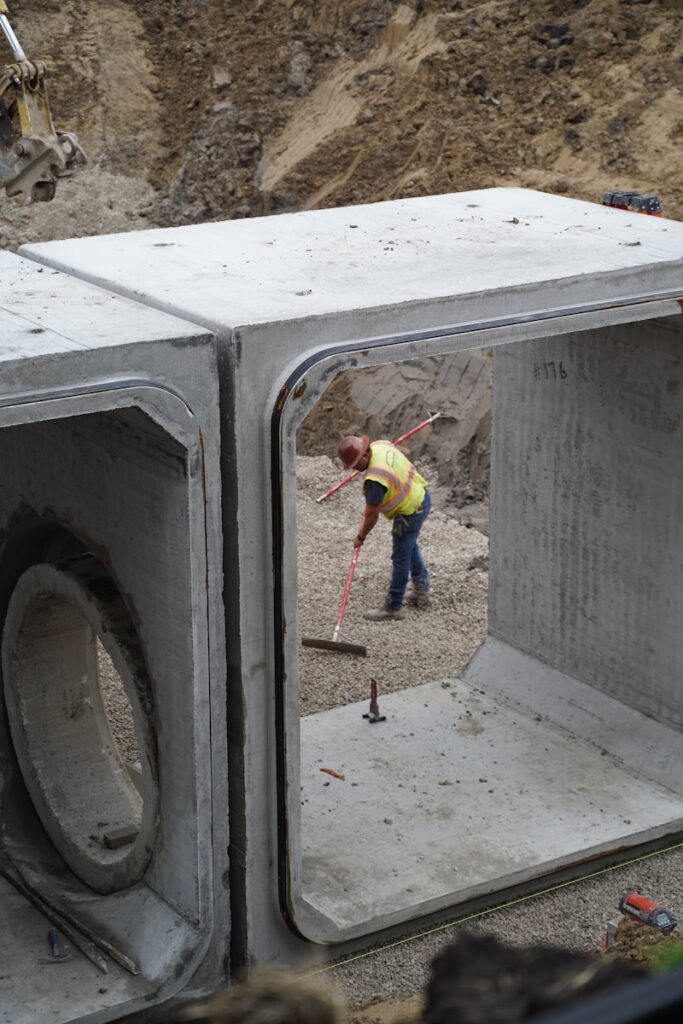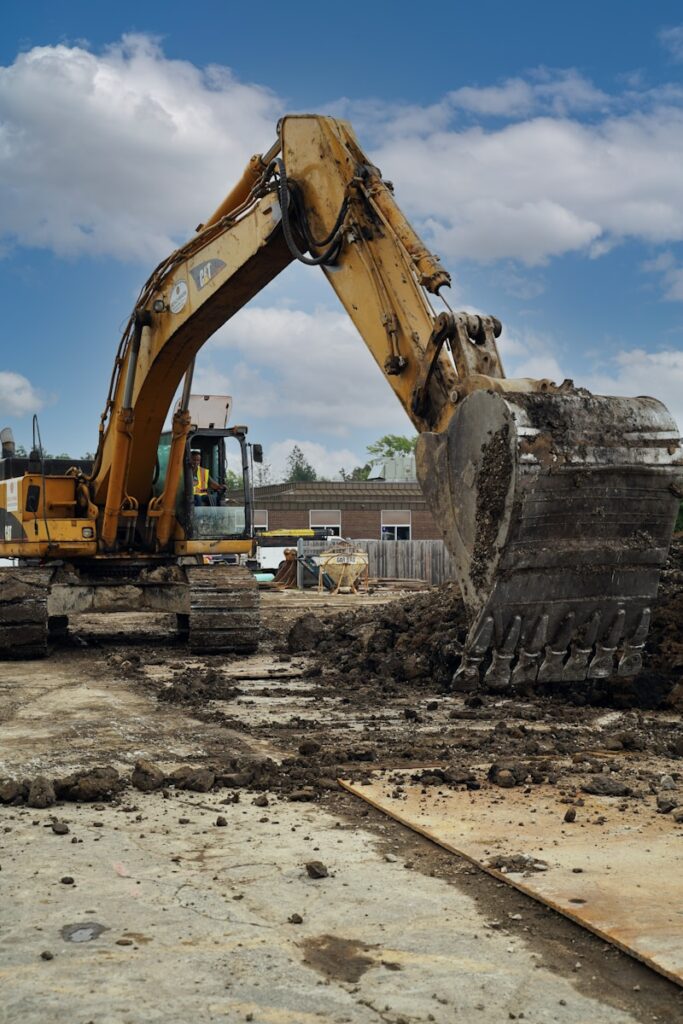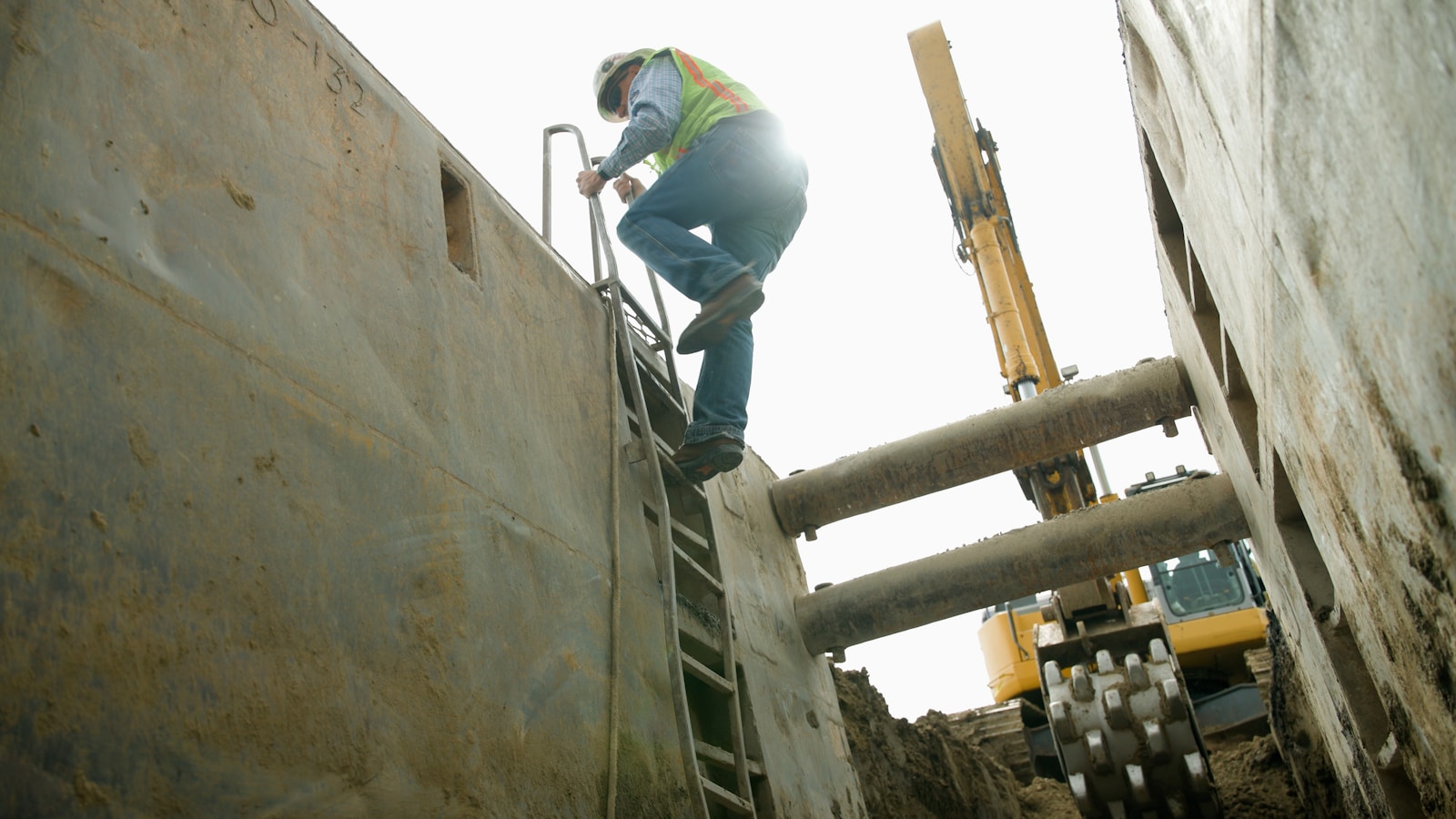Building Excellence Through Construction Engineering
South Coast Improvement Company (SCIC) has established itself as a leader in commercial construction and construction engineering across the East Coast. As a family-founded company, our client-first approach is built on integrity, professionalism, and a relentless commitment to innovation in both construction methods and materials. We believe that a successful project is more than just bricks and mortar; it’s about building lasting partnerships.
At the heart of our success is a deep understanding of construction engineering. This specialized field bridges the gap between the theoretical designs of civil engineering and the practical, on-the-ground realities of construction management. It’s the discipline that ensures a visionary blueprint becomes a safe, functional, and high-quality built environment.
Let’s explore how our expertise in construction engineering technology brings efficiency, safety, and quality to every project we take on.
What Is Construction Engineering (and Why It Matters to Your Project)?
Construction engineering is the practical application of engineering principles to the construction industry. While civil engineering focuses on the design of structures and public infrastructure, construction engineering is all about the “how.” It’s the art and science of turning a design into a physical reality, managing every detail of the construction process.
Our team applies advanced construction engineering technology to manage complex building projects. This means we don’t just follow plans; we optimize them. We leverage modern construction methods, comprehensive risk management protocols, and data analysis to ensure every project runs smoothly. This proactive approach allows us to foresee challenges, control costs, and maintain tight schedules without compromising quality.
SCIC’s commitment to innovation is central to our work. We use Building Information Modeling (BIM) to create detailed digital twins of our projects, allowing us to resolve conflicts before they arise on-site. We also champion the use of sustainable construction materials and implement smart construction planning to enhance project efficiency and reduce environmental impact.

Photo by CHUTTERSNAP on Unsplash
The Role of Civil Engineering in the Built Environment
Civil engineering provides the foundational blueprint for the entire built environment. It is the discipline responsible for the design, construction, and maintenance of structures like buildings, bridges, and other critical infrastructure. Without the precise calculations and creative problem-solving of civil engineers, complex construction would not be possible.
Successful project delivery depends on seamless collaboration. At SCIC, our civil engineers work hand-in-hand with project engineers and field engineers on both large and small-scale construction projects. This integrated teamwork ensures that the original design intent is executed flawlessly. Whether we are renovating a senior living facility, building a new healthcare wing, or modernizing an educational campus, our application of civil engineering principles guarantees structural integrity.
This focus is especially critical in occupied renovations and sensitive environments like healthcare facilities. We adhere to the strictest safety and compliance standards, ensuring that our work not only meets but exceeds regulatory requirements, protecting residents, patients, and staff at all times.
Behind the Build: Our Project Management Approach
Effective project management is the engine that drives every stage of our construction process. From the initial schematic design to the final on-site management, our dedicated project managers are the central point of contact, ensuring a smooth and transparent journey for our clients.
Our construction managers and project engineers excel at coordinating teams, managing subcontractors, and optimizing schedules for seamless project delivery. This meticulous oversight is supported by our single-source model, which streamlines the entire design and construction process. By eliminating the need for our clients to manage multiple, disparate construction contracts, we reduce complexity and establish clear accountability.
This communication-first approach is fundamental to how we operate. By fostering open dialogue and providing regular updates, we minimize downtime, prevent misunderstandings, and build the lasting trust that our clients have come to expect. Our goal is to make the construction process as stress-free as possible.

Photo by Evan Porter on Unsplash
Educational Foundations: How Construction Engineers Are Trained
Becoming a construction engineering professional requires more than just practical skill—it’s built on a structured construction engineering program that blends academic knowledge, technical training, and hands-on application. These comprehensive engineering programs are designed to prepare students for the complexities of today’s construction industry, from understanding design principles and construction estimating to mastering leadership and communication within large-scale projects.
Students progress through a curriculum that balances theory with practice, exploring both foundational and advanced topics that shape their ability to plan, build, and manage with precision. At South Coast Improvement Company (SCIC), we recognize the value of this educational groundwork. It’s where the future leaders of construction learn not just how to build structures—but how to think critically, solve problems, and execute with integrity in every phase of development.
Construction Engineering Technology
The journey into construction engineering technology begins with a solid academic and technical base. Most construction engineering students pursue a Bachelor of Science or undergraduate degree in this major, which combines engineering design, construction methods, and management principles.
At South Coast Improvement Company (SCIC), we understand that success in this field requires both education and hands-on experience. A strong CET program not only teaches the science behind structures but also prepares students to manage budgets, teams, and timelines effectively.
Associated Schools
Many leading associated schools, including Ohio University and other respected college programs, offer specialized degree programs in Construction Engineering Technology and Civil Engineering. These schools are designed to help students successfully complete their coursework while gaining exposure to real-world construction scenarios.
At SCIC, we proudly collaborate with universities and technical institutions to mentor students and provide internship opportunities that connect academic theory to practical construction site experience.
Required Core Courses
A well-rounded construction education requires a variety of core courses that address both technical and managerial skills. These typically include project management, cost estimating, scheduling, materials science, and business development.
These core studies ensure graduates understand every aspect of the construction process—from design to delivery—while strengthening their ability to lead teams and manage risk with confidence. This foundation produces engineers who can thrive in both commercial building and transportation projects.
Project Engineer
A project engineer plays a critical role in connecting the design phase to on-site construction activities. They apply the knowledge gained in their degree program to coordinate schedules, budgets, and resources, ensuring that every phase of a project meets quality and compliance standards.
At SCIC, our project engineers embody our values of communication, collaboration, and precision—bridging the gap between design intent and construction reality.
Project Manager
The project manager leads the overall effort, translating client goals into actionable construction plans. Their background in construction engineering technology and management principles enables them to oversee large-scale projects with efficiency and integrity.
Within SCIC, our project managers are trusted partners—ensuring every project is delivered safely, on schedule, and within budget. Their leadership keeps our teams aligned and our clients informed at every stage of development.
Educational Requirements
To enter this rewarding field, candidates must meet specific educational requirements set by universities and accrediting bodies. A Bachelor of Science or undergraduate degree in construction engineering technology, civil engineering, or a related major provides the academic foundation for most positions.
Beyond academics, aspiring engineers are encouraged to develop management, communication, and problem-solving skills essential to success in the construction industry.
Field Engineer
The field engineer is the link between planning and performance on the job site. They interpret blueprints, oversee technical implementation, and ensure safety and quality compliance in real time.
Our field engineers at SCIC combine theoretical understanding from their CET programs with practical experience to maintain seamless operations across every project—whether it’s a healthcare renovation or a large-scale commercial build.
ABET Accreditation
Accreditation by the Engineering Accreditation Commission (ABET) ensures that a degree program meets the general criteria and academic standards recognized throughout the construction industry and by government agencies.
Graduates from ABET-accredited programs are equipped with a competitive edge in the job market, often earning an average salary that reflects their expertise and credibility. At SCIC, we prioritize hiring and training professionals from these accredited programs to maintain our standard of excellence in every build.
From Education to Application
The foundation built through education is only the beginning. At South Coast Improvement Company, we believe the true measure of learning comes from applying that knowledge in the field. The principles, management skills, and technical understanding gained through a CET program or ABET-accredited degree translate directly into real-world impact on every construction site.
Whether it’s mastering cost estimating, coordinating complex schedules, or managing multidisciplinary teams, these lessons prepare future professionals to take on leadership roles in the built environment. In the next phase of the journey—from classroom to job site—these skills evolve into the expertise that drives successful construction careers.
From Classroom to Job Site: Real-World Construction Careers
A construction site is a dynamic environment where various roles come together to achieve a common goal. Each position requires a unique set of essential skills, and every team member plays a vital part in a project’s success.
- Field Engineer: This role is the technical eyes and ears on the ground. A field engineer ensures that work is proceeding according to the engineering plans and supervises on-site progress for technical accuracy.
- Project Engineer: Responsible for managing the project’s technical and administrative aspects, the project engineer coordinates design elements, tracks schedules, and helps manage the budget.
- Project Manager: The project manager is the client’s primary advocate, overseeing client relations, managing construction contracts, and ensuring the successful delivery of the entire project from start to finish.
- Construction Manager: This role integrates all on-site activities, focusing on safety, compliance, and quality assurance. They ensure that general contractors and subcontractors adhere to the highest standards.
SCIC is proud to provide clear paths for growth, mentorship, and leadership across all these industry careers. We invest in our people, knowing they are our greatest asset.
Innovation in Construction Engineering: The SCIC Advantage
Innovation is more than a buzzword at SCIC; it’s a core component of our project delivery method. We leverage advanced technologies, data analytics, and heavy civil construction methods to deliver superior results. Our team is skilled in implementing energy-efficient MEP systems, utilizing sustainable materials, and applying precision planning to every job.
This commitment to continuous improvement directly translates to client satisfaction. It’s why over 90% of our clients return for future projects. They know they can depend on our reliability, clear communication, and quality craftsmanship. Our track record of success and high rate of repeat business speak volumes about the trust we build with every project. We combine expertise with a forward-thinking mindset to push the boundaries of what’s possible in the construction company landscape.

Photo by Evan Porter on Unsplash
Why Choose South Coast Improvement Company?
Choosing the right construction partner is one of the most important decisions you will make. At SCIC, our differentiators make that choice clear. We offer proven experience in complex commercial builds and specialize in occupied renovations where safety and minimal disruption are paramount. Our single-source accountability model provides a streamlined experience from design through completion.
As a family-founded company, we bring integrity and a deep-seated commitment to building strong client partnerships. Safety, compliance, and sustainability are at the forefront of every decision we make. We combine the intellectual power of construction engineering with practical, hands-on construction expertise to deliver exceptional results.
When you partner with us, you’re not just hiring a contractor—you’re gaining a trusted construction engineering partner dedicated to your long-term success.
View Our Work
Aspen Dental
Partnering with The Aspen Group on the construction of a new Aspen Dental facility that’s functional & welcoming for patients & staff alike. South Coast Improvement Company was awarded the construction of a new Aspen Dental facility in Killingly, CT. The...
Springhouse Senior Living – HumanGood
Designed to enhance comfort & functionality. South Coast Improvement company was hired by HumanGood for an interior and exterior renovation at Springhouse Senior Living. Our skilled teamtransformed the 2nd through 5th floor common areas into brighter, more...






